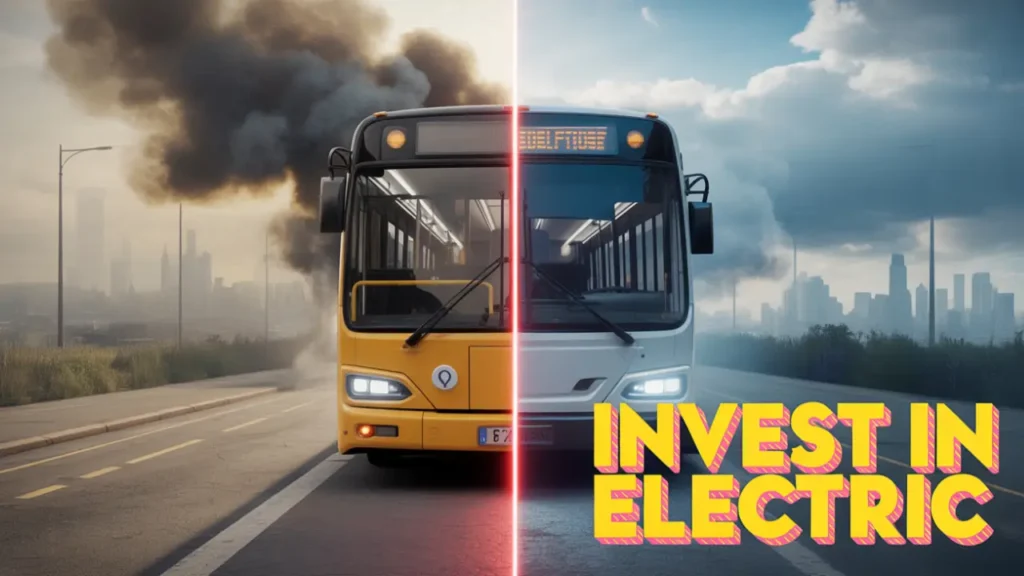JBM Auto Ltd. made headlines on Friday, September 12, after its shares witnessed a sharp rally following a landmark deal. The company’s subsidiary, JBM Ecolife Mobility, secured a $100 million long-term investment from the International Finance Corporation (IFC), a member of the World Bank Group. The news sent JBM Auto’s stock soaring by more than 8% in intraday trading.
The investment will be used to deploy 1,455 modern, air-conditioned electric buses across Maharashtra, Assam, and Gujarat. This deal is a milestone not only for JBM Auto but also for India’s growing push toward sustainable mobility. Nishant Arya, Vice Chairman and Managing Director of JBM Auto, described it as IFC’s largest e-bus deployment project in the world and its first direct capital investment in Asia’s electric bus sector.

JBM Auto Catalyst for the Rally
The primary reason behind JBM Auto’s stock surge was the announcement of the IFC investment. Such large-scale foreign participation reflects strong global confidence in India’s electric vehicle (EV) sector and highlights JBM Auto’s leadership in the space.
This project is expected to bring multiple benefits beyond financial gains. It is projected to reduce carbon dioxide emissions by 1.6 billion kilograms and save more than 600 million litres of diesel. The buses will serve over one billion passengers, improving urban mobility while cutting pollution.
In addition, the deployment is expected to create around 5,500 new jobs across different states. With the government focusing heavily on green mobility and clean energy, the IFC deal comes as a timely boost for both JBM Auto and India’s broader electrification journey.
JBM Auto’s Strong Fundamentals and Future Outlook
JBM Auto has been steadily strengthening its position in the EV market. The company has already deployed more than 2,500 e-buses across 10 states and 15 airports. It also has a massive active order book of around 11,000 buses, ensuring visibility of revenue growth in the coming years.
Its Delhi-NCR manufacturing facility is one of the largest integrated e-bus units outside China, with an annual production capacity of 20,000 buses. This scale of operations gives JBM Auto a competitive edge in meeting the rising demand for clean public transport solutions.
The company’s financials have also shown steady improvement. In its Q1 results for the quarter ended June 2025, JBM Auto reported a net profit growth of over 10% year-on-year, along with revenue growth of more than 9%. These figures indicate that the company is not only expanding its reach but also strengthening its earnings base.
However, analysts remain cautious about valuation levels. The stock has already delivered strong gains in recent months, and execution risks remain, especially given the dependency on government policies and subsidies for the EV sector. Still, the IFC partnership is seen as a strong endorsement of JBM Auto’s business model and long-term prospects.
JBM Auto Share Price Target and Market Sentiment
The recent surge in JBM Auto’s share price has attracted significant attention from investors. Market participants are closely tracking technical levels to gauge the next move. Analysts have identified the ₹665–₹700 zone as a key resistance range. If the stock manages to break decisively above this level, it could trigger another leg of the rally.
The IFC investment has undoubtedly boosted investor sentiment, strengthening the case for re-rating the stock’s valuation. While exact price targets will depend on execution of orders and broader market conditions, the outlook has become more positive following this development.
For long-term investors, JBM Auto’s strong fundamentals, order pipeline, and global partnerships position it as one of the leading players in India’s electric mobility revolution. However, short-term traders are advised to remain cautious, as volatility is expected in the coming sessions.
Conclusion
JBM Auto’s sharp rally following the IFC investment underscores the growing global confidence in India’s EV ecosystem. The deal not only strengthens the company’s financial position but also supports India’s ambitious target of electrifying public transport.
With a robust order book, strong manufacturing capabilities, and now a significant global partnership, JBM Auto is well-placed to play a leading role in the future of sustainable transport. While challenges remain, the IFC investment is a landmark moment for both the company and India’s electric mobility journey.
F.A.Q.
– Why did JBM Auto shares surge recently?
JBM Auto shares surged after its subsidiary, JBM Ecolife Mobility, secured a $100 million long-term investment from the International Finance Corporation (IFC), a member of the World Bank Group.
– What will the IFC investment be used for?
The funds will be used to deploy 1,455 air-conditioned electric buses across Maharashtra, Assam, and Gujarat, supporting India’s public transport electrification goals.
– How will this project impact the environment?
The project is expected to reduce 1.6 billion kilograms of carbon dioxide emissions, save over 600 million litres of diesel, and benefit more than one billion passengers.
– What is JBM Auto’s current order book?
JBM Auto has an active order book of around 11,000 buses and has already deployed more than 2,500 e-buses across 10 states and 15 airports.
– What is the share price target for JBM Auto?
Analysts are watching the ₹665–₹700 zone as a key level. A strong breakout above this range could trigger the next leg of the rally, although short-term volatility is expected.
Also read:-